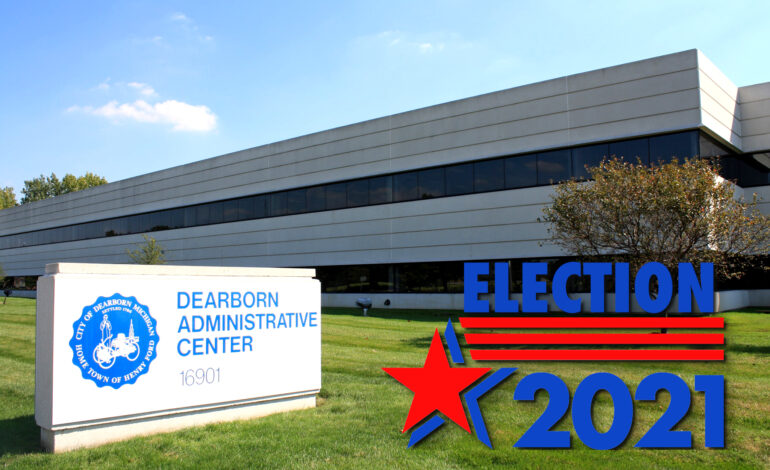DEARBORN — Voters in Dearborn will once again have a difficult decision to make in the upcoming general election.
Between selecting a new mayor for the first time in 14 years, all seven City Council members and nine members of a Charter Revision Commission, residents also have a proposal to decide on. All information on candidates can be found by searching the candidate names on www.arabamericannews.com.
Residents will also have a choice between a ballot in English or a ballot in Arabic.
Mayor
With Mayor Jack O’Reilly retiring, the city will have a new mayor for the first time since 2007.
State Rep. Abdullah Hammoud (D-Dearborn) had an excessive lead in the Aug. 3 primaries, with Gary Woronchak, a local journalist who has served in both the State House and on the Wayne County Commission taking second, beating out five other candidates, including Council President Susan Dabaja.
Clerk
Current City Clerk George Darany, a former Councilman and state representative, is running unopposed for reelection.
Darany has been city clerk since 2016. He’d previously served on the Dearborn City Council from 2007 until 2010, followed by six years as a state representative.
City Council
All seven City Council seats are up for election and voters will have 14 candidates to choose from.
Incumbents Robert Abraham, who has served on the Council since 2002; Leslie Herrick, who has served on the Council since 2018; Mike Sareini, who has served on the Council since 2013 and Erin Byrnes, who has served on the Council since 2018, are all seeking re-election.
Newcomers Silvio Davis, Khodr Farhat, Kamal Alsawafy, Gary Enos, Ken Paris, Sam Luqman, Saeid Alawathi, Lola Elzein, Khalil Othman and Mustapha Hammoud are also running for a position on the City Council.
Current Council members David Bazzy and Brian O’Donnell are not running for re-election.
Charter Revision Commission
With voters passing the proposal to create a Charter Revision Commission in the Aug. 3 primaries, they will now get a chance to vote on nine members out of 21 candidates.
Albert Abbas, Hassan F. Abdallah, Gussan Abdulkarim, Richard AlAziz, Elizabeth Bailey, Mark Dawdy, Laura Dudgeon, Sharon Dulmage, Hussein Hachem, Sam Hamade, Timothy Harrison, Cheryl Hawkins, Kimberly Ismail, Jamil Khuja, Michael Kuentz, Jim O’Connor, L. Glenn O’Kray, Fatmeh Saad, Mansour Sharha, L. Gail Walls and Jacklin Zeidan are running for the nine spots.
Rami Younes will also be on the ballot, but is no longer a resident of Dearborn and cannot serve on the commission.
The 55-page Dearborn charter was last updated in 2007 and went into effect on Jan. 1, 2008.
The charter is divided into 20 chapters, which address such things as the city’s boundaries and political divisions, general municipal powers, the powers of the Council, the executive department (including the mayor, clerk, and treasurer), elections, finances and taxes, and public improvements, among other topics.
Section 19.5, “Amendments and revision”, states that at the 2021 primary election and every 12 years after that, “and at such times as may be provided by law”, voters will decide whether to revise the charter. So voters will not get another chance to make changes or updates to the charter for 12 years.
Proposals
Voters will also be asked to approve a supplemental, temporary tax to fund city operations, including critical services such as police and fire protection.
Approval of the proposal would cost the average Dearborn homeowner $167 per year, a $46 per year deduction from what the average Dearborn homeowner is currently paying.
Without the approval of the supplemental millage, more than $16 million in city revenue will be lost, leading to the significant reduction of resources for Dearborn programs and services, including funds available for public safety, which is a 12 percent across-the-board-cut.
Dearborn has a reputation for providing a high level of city services and has significantly more police and firefighters per capita than any other city in this area and in the state.
Voters have approved temporary millages in the last 10 years to supplement the tax rate allowed by the Dearborn City Charter in order to pay for these services.
Voters last approved 3.5 mills for five years in 2016, which is expiring soon. If voters agree in November, that 3.5 mills would be replaced with the lower rate of 2.75 mills and would be for a duration of three years instead of five.
The Dearborn City Charter limits operating mills to 15 and state law allows 20. Voters have the power to raise the city’s operating millage rate up to 20 mills by amending the city charter limit.
Previous voter approvals set the limit at 18.5 mills and the ballot proposal lowers the operating millage to 17.75 mills.
If approved, the lower tax rate would go into effect on July 1.






Leave a Reply